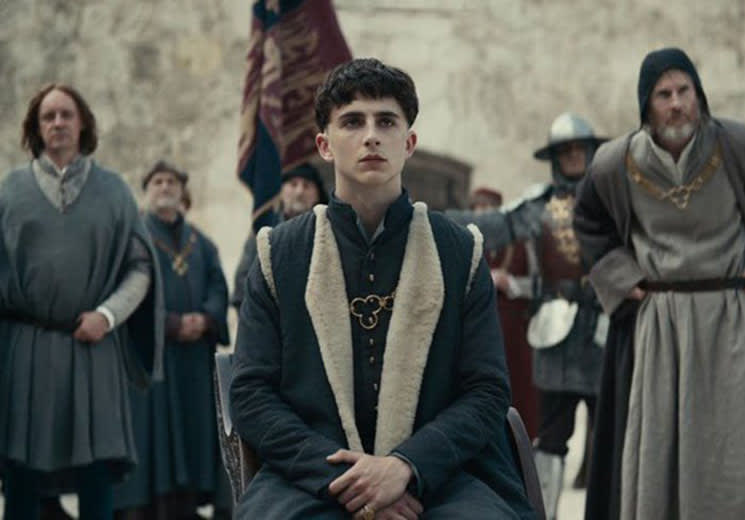A pacifist, alcoholic prince is the reluctant heir to the throne of England following the deaths of his brutish father and naive younger brother. He learns quickly that his newfound power will not offer him the peace and unity among kingdoms that he desires. Soon enough, he finds himself thrust into political tensions with France, as provoked by a brush with an assassin. This story is one loosely based on the rebellious King Henry V of England, chronicling the Battle of Agincourt — a tale most famously told by William Shakespeare.
Director David Michôd's vision of King Henry V, or "Hal" (played by Timothée Chalamet), is an abbreviated one — even at a runtime of 140 minutes — yet he manages to offer the story the care it deserves nonetheless. Instead of a lengthy history lesson, Michôd's The King is a dramatization focusing on trust and deceit, disgrace and valour. And through the film's congruous casting, Michôd tells the tale of a disgraced monarch's rise to glory.
Early on, we learn the young king is emotionally stunted by his poor relationship with his father. To compensate, he proceeds hastily through life, and his arrogance is quickly turned against him. Now in a position of power and feeling vulnerable to betrayal, he puts trust in his closest friend, Falstaff (Joel Edgerton). But is he relying too much on his loyalty? Hal begins to trust no one, but he doubts himself most of all. He is forced to start making bold political moves, sometimes at the expense of his followers. The lives of his subjects are at stake — and so is his honour. Turns of fate have it that Hal will go against his pacifist nature and lead his army into battle against France, finally gaining the chance to prove himself as one of the great kings of England, but against his deepest held morals.
The film is at its most spectacular in the battle scenes that follow, namely the flaming trebuchet siege on Normandy and the subsequent muddy Battle of Agincourt, led by Falstaff and the Dauphin of France (Robert Pattinson). These impressive scenes are intricately choreographed feats comprised of hundreds of flailing men in chainmail, dozens of armoured horses and innumerable deadly, flying arrows. The war strategies played out here are as thrilling to behold as they are emotionally straining, with Michôd mining a healthy dose of violence while managing to tastefully avoid the gratuitous.
A major twist in the film's final chapter is overshadowed by including Hal's meeting with King Charles VI of France's daughter Catherine of Valois (Lily-Rose Depp). The two are to be married, and form a strange distaste for each other within moments of being introduced, only to immediately concede to an alliance under the pretense of their happenstance proximity and apparent trust of one another. The King would have been better off wrapping up following its big reveal, and omitting this plotline entirely, along with its coinciding blasé acting from Depp.
(Netflix)Director David Michôd's vision of King Henry V, or "Hal" (played by Timothée Chalamet), is an abbreviated one — even at a runtime of 140 minutes — yet he manages to offer the story the care it deserves nonetheless. Instead of a lengthy history lesson, Michôd's The King is a dramatization focusing on trust and deceit, disgrace and valour. And through the film's congruous casting, Michôd tells the tale of a disgraced monarch's rise to glory.
Early on, we learn the young king is emotionally stunted by his poor relationship with his father. To compensate, he proceeds hastily through life, and his arrogance is quickly turned against him. Now in a position of power and feeling vulnerable to betrayal, he puts trust in his closest friend, Falstaff (Joel Edgerton). But is he relying too much on his loyalty? Hal begins to trust no one, but he doubts himself most of all. He is forced to start making bold political moves, sometimes at the expense of his followers. The lives of his subjects are at stake — and so is his honour. Turns of fate have it that Hal will go against his pacifist nature and lead his army into battle against France, finally gaining the chance to prove himself as one of the great kings of England, but against his deepest held morals.
The film is at its most spectacular in the battle scenes that follow, namely the flaming trebuchet siege on Normandy and the subsequent muddy Battle of Agincourt, led by Falstaff and the Dauphin of France (Robert Pattinson). These impressive scenes are intricately choreographed feats comprised of hundreds of flailing men in chainmail, dozens of armoured horses and innumerable deadly, flying arrows. The war strategies played out here are as thrilling to behold as they are emotionally straining, with Michôd mining a healthy dose of violence while managing to tastefully avoid the gratuitous.
A major twist in the film's final chapter is overshadowed by including Hal's meeting with King Charles VI of France's daughter Catherine of Valois (Lily-Rose Depp). The two are to be married, and form a strange distaste for each other within moments of being introduced, only to immediately concede to an alliance under the pretense of their happenstance proximity and apparent trust of one another. The King would have been better off wrapping up following its big reveal, and omitting this plotline entirely, along with its coinciding blasé acting from Depp.




